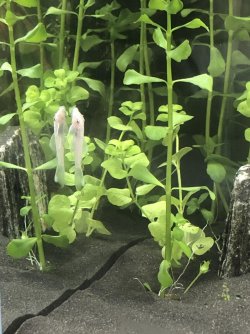TomRadford12354
Fish Fanatic
Hello,
Hope every one is having a good day
Just got my fish 2 days ago . They are amazing by far the best hobby I have taken up.
Problem:
So I got myself a Snow White Ancistrus and i love It . The first day he was having a whale of a time eating bio film and digging underneath my rocks making Caves . But Yesterday he wasn't eating any food or actually doesn't even approach it . It Spends most of its time sitting in one place not moving . I fed him when I turned the lights of last night didn't even approach the cucumber which it loves according to the Store .
So im a bit stumped on if he is ill or well I don't really no . The only thing I can think of is I added some plant fertiliser but this didn't seem to bother any of the fish who are happier than usual .
Hope someone knows what's wrong or maybe it is just normal .
Thanks in advance
Hope every one is having a good day

Just got my fish 2 days ago . They are amazing by far the best hobby I have taken up.
Problem:
So I got myself a Snow White Ancistrus and i love It . The first day he was having a whale of a time eating bio film and digging underneath my rocks making Caves . But Yesterday he wasn't eating any food or actually doesn't even approach it . It Spends most of its time sitting in one place not moving . I fed him when I turned the lights of last night didn't even approach the cucumber which it loves according to the Store .
So im a bit stumped on if he is ill or well I don't really no . The only thing I can think of is I added some plant fertiliser but this didn't seem to bother any of the fish who are happier than usual .
Hope someone knows what's wrong or maybe it is just normal .
Thanks in advance




